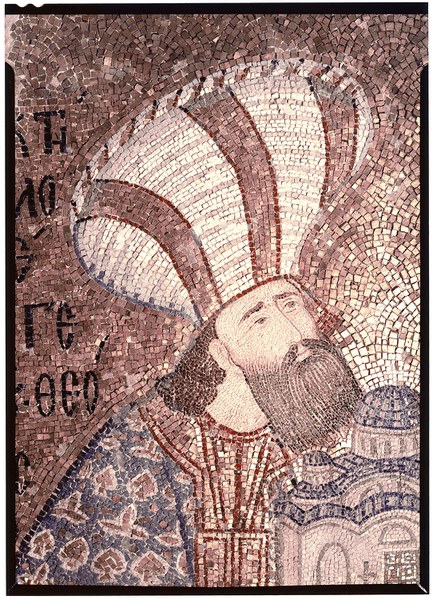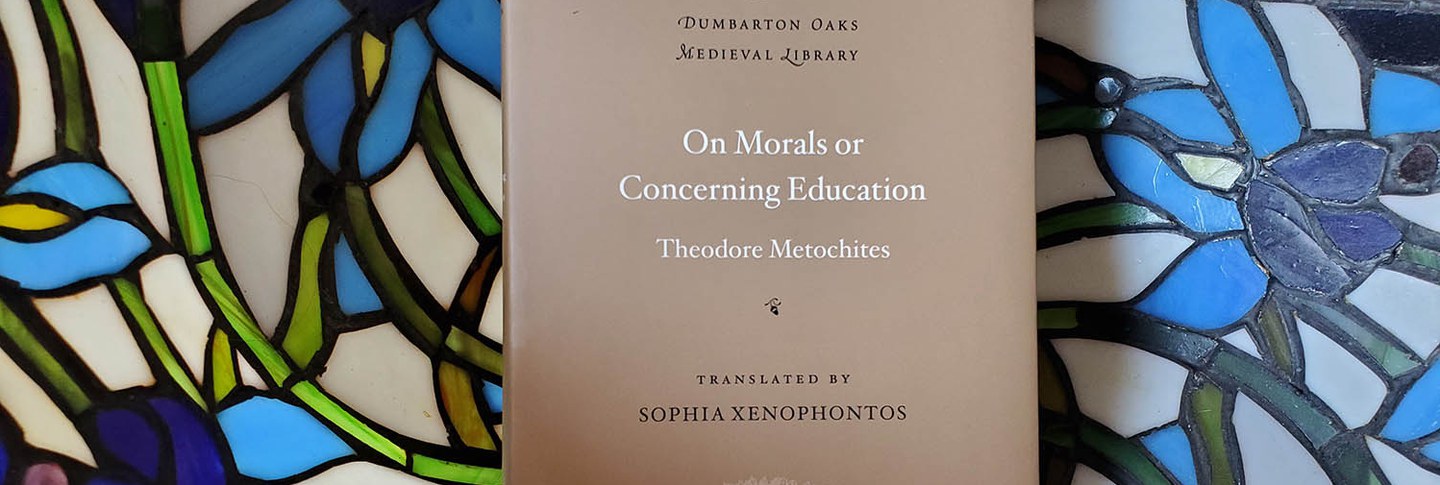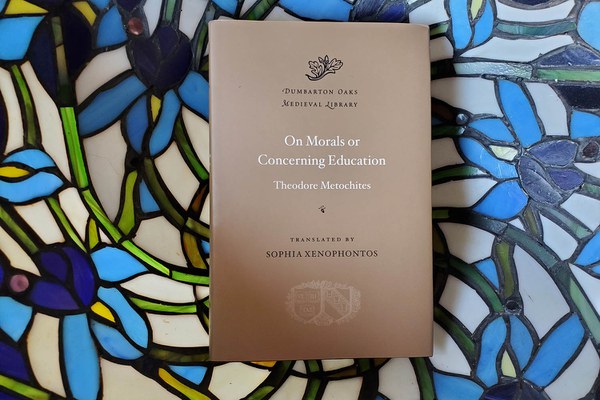By John Kee
The question weighs in one way or another on a lot of minds these days. But it’s by no means a new one, as the recent publication of On Morals, or Concerning Education by Theodore Metochites (Harvard University Press, 2020) amply demonstrates. Sophia Xenophontos’s translation for the Dumbarton Oaks Medieval Library makes this work, composed just over seven hundred years ago, available to English-speaking readers for the first time at a particularly apposite moment.
Of course, given that centuries-long interval, Metochites does not frame his subject in quite the terms we would, but the era in which he wrote was unquestionably marked by crisis. A leading politician as well as a prolific author, Metochites served as chief minister to Andronikos II Palaiologos (r. 1282–1328), an emperor whose long reign saw the Byzantine Empire— triumphantly reconstituted only a generation before—under attack from every side. Catalan mercenaries, Serbian kings, and (most ominously for those who know what comes next) a new Turkish dynasty known as the Ottomans each chewed off chunks of the realm. Famine and economic disaster afflicted even the regions spared direct violence. Through it all, Metochites stood at the very center of power, though his public career was perhaps more successful for himself personally than for the imperial community at large. A healthy appreciation for the pecuniary advantages of high office, including lucrative diplomatic visits to foreign courts across the Balkans and the eastern Mediterranean, made the minister one of the wealthiest men of the time. Back at home, Metochites’s response to rural devastation and an ensuing refugee crisis in the major cities was marked more by hardheaded (some said rapacious) focus on declining tax revenues than humanitarian concern for the displaced people themselves.

Our author originally gained his eminent position, however, not by dint of birth or any special administrative flair but by his attainments in classical education. Reconciling the demands of his active political role with the love of learning that first brought him to the emperor’s attention forms one of Metochites’s principal concerns in On Morals. The result is a wide-ranging meditation on the nature and significance of intellectual life. Metochites makes a particular point of the joy of education and intellectual discovery, despite the effort involved. The benefits of that endeavor, he argues, are impermeable to worldly success or failure and thus offer a steady refuge in the most trying circumstances. Yet practical concerns have their place too—especially for someone with responsibilities to a community, philosophy is not (despite what Plato may say) the only or even an unerring guide to correct action. On Morals thus finally lands in a balanced position: education offers indispensable training and a source of immense independent value, but not the be-all and end-all of life’s worth.
So what precisely does “education” mean for this author? Considered abstruse even in his own time, Metochites in the original makes no easy read. Xenophontos’s success in plotting a cogent English course through Metochites’s often dark and dense Greek counts as an achievement of scholarly interpretation even more than can be said of most translations. Examples of the difficulty extend down to the level even of the word—and particularly, of the word for “word.” The Byzantines grouped all intellectual pursuits, from fine literature to panegyric oration to philosophical and even scientific inquiry, under the general heading of logos. As Xenophontos lays out in her introduction, that term has an exceptionally broad range of reference, meaning “word” as a unit of speech and “reason” as a mental faculty as well as almost anything produced in or by either of the two: both the product and the representation of the most distinctively human capabilities. And it is education as logos in this richly layered sense that Metochites extols in On Morals. Valuing education, that is, means valuing what makes us human. To take just a bit of liberty with the terminology, this is a book about the humanities.
Dumbarton Oaks has a longstanding relationship with Metochites. Among the first projects funded by the young research institute starting in 1947 was the decades-long restoration of the Chora Monastery (now Kariye Camii), which was refounded by Metochites himself in 1315–1321 with the help of his questionably gotten gains, and whose sumptuous mosaics and frescoes make up his most concrete legacy. (Those who have been in Istanbul may recognize the Byzantine author-official from the statement-making donor portrait in the narthex, pictured above!) So it is perhaps fitting that, in this year of crisis, the Dumbarton Oaks Medieval Library publishes this author’s most sustained reflection on a question so central to Dumbarton Oaks’ own mission. We certainly don’t need to agree with or even admire Metochites, whose administrative career was no model of civic virtue as either we or his contemporaries would understand it. But in the claustrophobia of the present—both of quarantine and of the looming uncertainty about what’s to come—it is refreshing to be given the past’s perspectives on contradictions that continue to exercise us. As On Morals suggests, balancing the independent value of intellectual activity with the needs of a tumultuous world is not an easy task. Neither, though, is it a new one—it may be, instead, a challenge inherent in having any intellectual activity at all.
Buy On Morals and browse other DOML volumes at domedieval.org.
Please visit the online finding aid for the Byzantine Institute and Dumbarton Oaks Fieldwork Records and Papers to learn more about the collection this photograph belongs to.
John Kee is a PhD candidate in Byzantine Greek at Harvard University and a 2020 summer intern with the Dumbarton Oaks Medieval Library.

